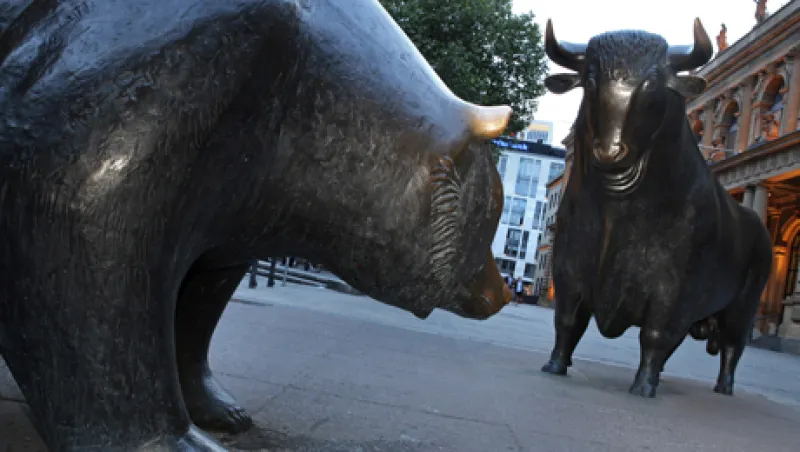For many venture capitalists, 2012 is the year of reckoning.
As with other asset classes, venture fundraising has been affected by the U.S. budget crisis, the troubles in Europe and the Arab Spring. It’s an inclement investment climate for all assets, but even more so for alternatives, which tend to be longer-term and less liquid. Many institutional investors are sitting on the sidelines, loaded with cash.
But what is hurting VC funds the most is their inability to take companies public and distribute the returns to their limited partners. Only 11 venture backed companies went public in the fourth quarter, up 120 percent from the third quarter of 2011 but down 67 percent from the fourth quarter of last year, For the full year, 52 venture-backed companies went public representing a value of $9.9 billion, a 31 percent decline in volume though a 41 percent increase in dollar value from 2010.
“Venture capital funds need to raise $20 billion or more in 2012 or face sharp contractions,” warns Mark Heesen, president of the National Venture Capital Association, in an interview. The figure represents the sum of commitments made by VC funds to support existing portfolio companies — many that haven’t been able to go public — as well as amounts to make follow-ons and new investments. For the last three years, venture capitalists have spent more money than the funds they have raised. Yet with funds raised over the last three years ($16.2 billion in 2009, $13.3 billion in 2010, and an estimated $15 billion or so in 2011) well below that level, the target cited by Heeson may prove to be elusive. The victims may be the mid-sized to large venture-backed company that have already raised multiple rounds of expensive private capital and need cheaper public capital to continue.
A recent survey by the NVCA found that 58 percent of industry respondents expect investment decreases in the biopharmaceutical and medical device sectors and 55 percent expect investment levels to decline in clean technology companies. The worst affected might be biotech and cleantech start-ups that may have raised more than $30 million to $40 million in their first round of financing. With biotech and cleantech venture funds among the worst performing funds of the last decade, many may not be around to do the follow-ons.
Many of these funds may end up part of the dreaded “zombie” fund phenomenon, according to a survey by Coller Capital, a U.K. based secondaries firm. Coller’s reports found a preponderance of funds where the general partners had no prospect of earning carried interest based on capital gains and were merely investing large amounts to prolong the fund’s life and to generate management fees.
In fact, they have been making large investments in companies that are far removed from product, sales or even profitability. There is only the most remote of chances for any of these investments to provide liquidity.
Of course, venture capital funds raise their money from the same alternative asset pool that private equity funds and hedge funds get their money. And although all fund classes went through their own meltdowns in 2007 and 2008, hedge funds and private equity funds have recovered faster. And venture funds are discovering that survival and success isn’t simply about delivering what they promised but also about providing returns superior to other competing asset classes.
For all the doom and gloom around hedge funds, they have outperformed venture capital funds, notes Jeffrey Jay, managing director of Great Point Partners, a Greenwich, Conn., hedge fund that manages an estimated $1 billion in life sciences assets. “The median annual return for the last 10 years for VCs is negative while median hedge fund returns are high single-digit positive per year,” explains Jay, who began his career in finance as a venture capitalist with Canaan Partners.
Indeed, hedge funds expect a surge of new money in 2012. A study of hedge fund investors by Prequin, a London based research concern, found that 38 percent plan to increase their allocations to hedge funds, 53 plan little change and only 9 percent expect a cutback.
Venture capital funds also are facing stiff competition from private equity funds when it comes to capital distribution. Carlyle, TPG, Blackstone and KKR, the four biggest private equity funds, distributed $60 billion to their investors in the first three quarters of 2011 alone, 50 percent more than the amount venture funds have raised in the last three years.
Industry veterans believe institutional investors are going through a fundamental re-evaluation of how they want to participate in venture capital and what they want venture capital to accomplish. For many institutional investors, especially university endowments, venture capital was never about generating alpha but about technology transfer and commercialization of innovation. Clearly the industry’s success at generating superior returns in the 80s and 90s changed that. And now with venture capital’s dismal 10-year performance, many LPs want the industry to go back to technology transfer and innovation commercialization, not promise returns that can’t be delivered.
Many observers say angels and super-angels are replacing venture funds at the seed stages, with far less pomp and ceremony. And limited partners who continue to believe in the value that venture capital offers, including institutional investors, are buying venture partnerships at heavily discounted prices in the secondary markets. Some need cash; others just want to shed their VC assets.
With so many venture capital partnership interests available at a discount and closer to maturity, why should alternative asset buyers invest in fully-priced, longer-term VC assets, says veteran attorney Joseph Bartlett of Sullivan & Worcester in New York. “Too much deal flow from secondary sellers for any alternative asset investor to ignore,” Bartlett explains. And the former Under Secretary of Commerce and specialist in venture capital and entrepreneurial matters contends that the fundraising climate won’t change much, because “the IPO window remains effectively closed.”






